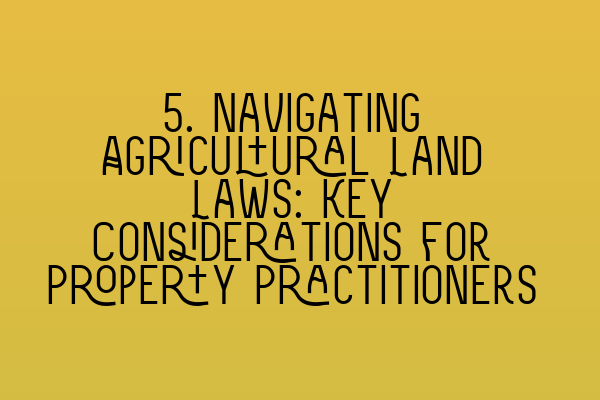Agricultural land laws can be complex and navigating them successfully requires in-depth knowledge and expertise. As a property practitioner, understanding the key considerations when dealing with agricultural land is crucial to providing effective legal advice to your clients. In this blog post, we will explore five key aspects of agricultural land laws that every property practitioner should be aware of.
1. Types of Tenancies
One of the primary considerations when dealing with agricultural land is the type of tenancy agreement in place. The two most common types of agricultural tenancies in England and Wales are Agricultural Holdings Act (AHA) tenancies and Farm Business Tenancies (FBTs). It is essential to understand the differences between these tenancy types and the implications they have on the rights and obligations of both landlords and tenants.
For a comprehensive overview of agricultural tenancies, SQE Property Law provides an informative guide on Understanding Agricultural Tenancies. This resource covers the key provisions of AHA and FBTs, including rent regulations, succession rights, and termination procedures.
2. Environmental Considerations
Environmental regulations play a significant role in the use and development of agricultural land. Property practitioners should be familiar with the relevant laws and guidelines governing issues such as pollution control, waste management, and wildlife conservation. Additionally, understanding the impact of these regulations on landowner liabilities and responsibilities is essential when advising clients.
If you require a refresher on the environmental considerations associated with agricultural land, SQE Property Law offers a practical guide on Environmental Law in the Context of Agricultural Property. This resource delves into the key legislation, including the Water Resources Act 1991 and the Environmental Protection Act 1990, and provides insights on compliance requirements and potential legal challenges.
3. Common Agricultural Policy (CAP)
The Common Agricultural Policy (CAP) is the agricultural policy framework implemented by the European Union. Despite the UK’s withdrawal from the EU, CAP regulations still apply during the transition period. Property practitioners should be aware of the impact of CAP on agricultural land and the subsidy schemes available to farmers.
For a comprehensive understanding of the CAP and its implications, SQE Property Law offers a detailed guide on CAP and Agricultural Property. This resource covers the various CAP schemes, including Basic Payment Scheme (BPS) and Countryside Stewardship, as well as the eligibility criteria and application processes involved.
4. Planning Permission and Development Potential
When advising clients on agricultural land, it is crucial to consider the potential for development and the requirements for obtaining planning permission. Understanding the relevant planning laws and policies is essential to assess the feasibility of various development projects.
SQE Property Law provides an insightful guide on Planning Considerations for Agricultural Land, offering an overview of the planning regime in England and Wales, permitted development rights, and the restrictions on agricultural conversion. This resource can assist property practitioners in evaluating the development potential of agricultural land and providing accurate advice to clients.
5. Rights of Way and Access
Finally, property practitioners must consider the rights of way and access issues associated with agricultural land. Farmers often rely on access routes and public rights of way to reach their fields and grazing areas. Understanding the laws surrounding public rights of way and any restrictions or obligations related to agricultural land is crucial for property practitioners.
SQE Property Law has a comprehensive guide on Rights of Way and Access on Agricultural Land that covers the legal framework governing rights of way and access issues. This resource is designed to help property practitioners navigate the complexities of access rights and provide accurate advice to their clients.
Understanding the key considerations in agricultural land laws is essential for property practitioners. By familiarising yourself with the various tenancy types, environmental regulations, CAP, planning permission requirements, and rights of way issues, you can provide effective legal advice to your clients and navigate the complexities of agricultural land with confidence.
For further resources and preparation materials for the SQE exams, be sure to check out the links below:
